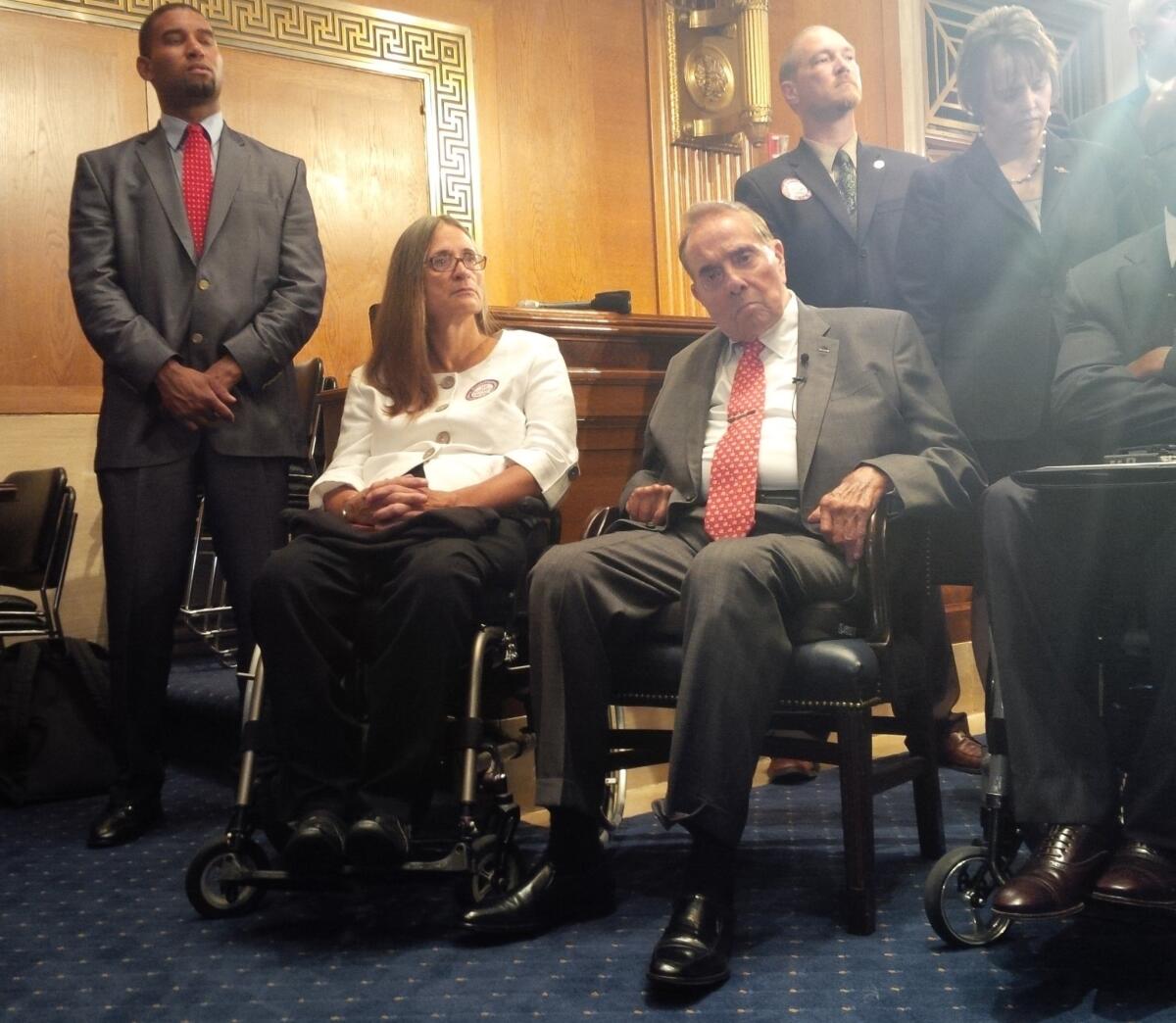Bob Dole returns to Capitol, takes on GOP critics of disability treaty

Former Sen. Bob Dole appears at a news conference on Capitol Hill, where he visited to support ratification of the Convention on the Rights of Persons with Disabilities.
- Share via
Reporting from Washington — As they renewed their uphill battle Wednesday to ratify an international treaty on disability rights, Senate supporters focused on the potential benefits for disabled veterans and accused treaty opponents of “sowing lies and discord.”
But sitting at the edge of the assembled advocates was the man whose sheer presence they hope can beat back Republican opposition to the Convention on the Rights of Persons with Disabilities: the Senate’s former majority leader, Bob Dole.
“As a Republican, I don’t want to see a headline saying, ‘Republicans vote against disabled Americans and disabled veterans,’” he told senators.
The last time the Senate voted on the issue in December 2012, Dole’s presence was not enough to push the treaty to the 67 votes needed for ratification. That failed 61-38 vote was all the more striking because opposition came only from Republicans – including many with whom Dole had served and both of his fellow Kansans.
Since retiring, Dole has trekked to the Capitol only sparingly. Wednesday’s was the first visit since a ceremony in his honor one year ago to mark his 90th birthday. Though he lives in Washington, Dole has returned often to Kansas of late, so far visiting 63 of its 105 counties on what he calls a “thank you” tour.
He’s largely shied from politics, though he narrates a new ad for one of Kansas’ members of Congress, highlighting various Obama administration controversies.
Wednesday marked another return to the political fray.
Dressed in a crisp gray suit with a red tie dotted with miniature American flags, Dole mostly sat quietly Wednesday as speaker after speaker called for passage of the treaty that has been a personal cause of his. At one point he pumped his fist, when Sen. Kelly Ayotte (R-N.H.) noted Dole had just celebrated another birthday the day before.
“We would not have united in this effort, we would not be continuing this effort until we see it through to completion, without Sen. Bob Dole,” said Sen. John McCain (R-Ariz.), like Dole a war veteran and onetime GOP presidential nominee.
When his turn came to speak, Dole sounded every bit like the man who’d run the Senate, noting there was “a pool of about eight senators” whose votes were probably still in play.
“I won’t say we’ll get all of them, but we can get some of them,” he said.
The treaty, advocates say, would bind signatories to many of the same safeguards of the Americans With Disabilities Act, including access to education and prohibitions of discrimination in hiring. Sen. Mark Steven Kirk (R-Ill.), a former intelligence officer in the Navy Reserve who suffered a stroke in 2012, said ratifying the treaty would be “the best pro-veterans vote that the Senate could cast this year.” Kirk, who often uses a wheelchair, said even he hesitates about traveling internationally to avoid “an embarrassing situation” created by the lack of access for those with disabilities.
“If you fought for freedom around the world, you should be able to freely move around the world,” he said.
But conservative groups have rallied opposition, saying the bill’s provisions could supersede U.S. law.
Proponents of home-schooling have been among the most vocal critics. Will Estrada, director of federal relations for the Home School Legal Defense Assn., said there was concern a provision of the treaty could be interpreted by “activist judges” as justification for requiring disabled children to be educated in traditional schools.
“Our country has been a world leader for people with disabilities. We don’t need to ratify this treaty to do that,” Estrada said.
Ayotte called such views “myths,” and said the treaty would not impose new responsibilities on the U.S., but push other nations to live up to the “gold standard” of the Americans With Disabilities Act.
Tom Tarantino, chief policy officer for the Iraq and Afghanistan Veterans of America, accused opponents of “craving personal attention or profiting from sowing discord on the backs of the disabled community” – a charge that prompted Dole to nod in agreement.
Dole, the longest-serving Senate Republican leader, said there was “no reason to be against this treaty,” and later also singled out “home schoolers” who had flooded Capitol office phone lines.
A new vote on the treaty is not expected until after the Senate’s August break, and perhaps not until a lame-duck session after November’s election. Few past opponents of the treaty have indicated they will change their votes, but Sen. Tom Harkin (D-Iowa), who supports the bill, said he would not “concede any votes until the votes are cast.”
Asked whether he would return again to help drum up support, Dole said simply that he’ll “be around.”
“But I can’t vote,” he added.
Follow @mikememoli for more news out of Washington.
More to Read
Sign up for Essential California
The most important California stories and recommendations in your inbox every morning.
You may occasionally receive promotional content from the Los Angeles Times.











